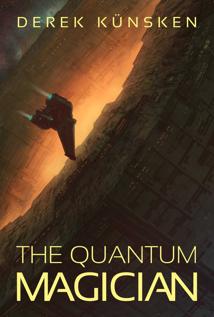
A con man called Gander had once taught him that there were only three bets. Sometimes, you play the cards. Sometimes, you play the player. Sometimes, you just throw the dice.
The Quantum Magician is … not what I expected. I’m sure at one point, I read the blurb, but I’ve slept since then. So all I had to go on when I picked it up just now was the title.
I honestly expected something urban fantasy. Perhaps some handwavey quantum explanation for how ‘magic’ works.
I did not expect a sprawling space opera, full of radically divergent subspecies of future humanity, getting into just what it means to be ‘human’. I did not expect some fascinating (if improbable) advanced technology and worldbuilding–there are fascinating scenes both in space and deep in various oceans. And I did not expect a rather excellent heist wrapped up in a con.
I was nevertheless pleasantly surprised.
It’s a fascinating book, well worth the read. I recommend the audiobook. Hearing the variations in language done via accents (Français 8.1 and Anglo-Spanish come to mind) is a lot of fun.
One content warning: There are some fascinating but also rather disturbing parts of this book revolving around enslavement, free will, and humiliation. If any of that is not your thing, this book will certainly not be.
A bit more:
I think my favorite part of the worldbuilding was how the ‘crew’ that our main character collects is has members from all the far flung branches of humanity. I love the idea that as humanity spread out into the stars, we would find it easier to adapt ourselves to the environments we find out there, rather than trying to bend entire worlds to our needs.
I love the idea of our protagonist Belisarius. He’s Homo quantus. Autism turned to 11, with augments allowing one to dial up savantism on demand–or even go well beyond it. At cost. It’s … an interesting take. I’m honestly not sure I like it, but it’s certainly interesting.
So when one thing leads to another and that’s not enough, what does he turn to? Crime. It’s a wonderful puzzle after all.
I love the idea of how A.I. are presented. They’re fully people in their own right, but to have one of the last great bastions of modern (to our eyes) religion buried in the core of the programming of one A.I. St. Matthew? Delightful.
“Things seem to be going well here,” Belisarius said.
“Yes. The batches of autonomous robots are at generation six, and are evolving quite nicely.”
“You didn’t want to design them directly? This is going to take longer.”
“I’m a craftsman, Mister Arjona, not a hack. Iterative design by the mutation of replicating units is better. Emerging complexity and self-assembly are too useful not to exploit. And it’s the only way to see if I could evolve robotic species with souls.” “What?”
“I admit, it’s a long shot, but while I’m evolving autonomous robots for one reason, why not test whether I can give them souls too?”
And I love the idea of the Mongrels. A people that arrived in a new star system looking for home–only to find orbital bombardment destroying anything on any surface. The only solution? To become essentially walrus people, living deep in the oceans. And the psychology of what that does to a person?
Oh it’s all so delightful. There’s so much more to each of them (and a couple major branches I haven’t even mentioned). I just wanted to make sure to mention it–it’s a main selling point for me.
Now the only question to me… what in the world comes next?